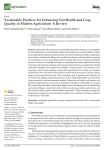Topa D.-C., Capsuna S., Calistru A.-E., Ailincai C. (2025). Sustainable practices for enhancing soil health and crop quality in modern agriculture: a review. Agriculture, 01/05/2025, vol. 15, n. 9, p. 998.
https://doi.org/10.3390/agriculture15090998
https://doi.org/10.3390/agriculture15090998
| Titre : | Sustainable practices for enhancing soil health and crop quality in modern agriculture: a review (2025) |
| Auteurs : | D.-C. Topa ; S. Capsuna ; A.-E. Calistru ; C. Ailincai |
| Type de document : | Article |
| Dans : | Agriculture (vol. 15, n. 9, May 2025) |
| Article en page(s) : | p. 998 |
| Langues : | Anglais |
| Langues du résumé : | Anglais |
| Catégories : |
Catégories principales 06 - AGRICULTURE. FORÊTS. PÊCHES ; 6.6 - Technique Agricole (sols, engrais, mécanisation)Thésaurus IAMM PRATIQUE AGRICOLE ; DURABILITE ; MODE DE CULTURE ; SOL ; AMELIORATION DES SOLS |
| Résumé : | Soil health is the cornerstone of sustainable agriculture, serving as the foundation for crop productivity, environmental resilience, and long-term ecosystem stability. Contemporary agricultural methods, characterized by excessive pesticide and fertilizer application, monoculture, and intensive tillage, have resulted in extensive soil degradation, requiring novel strategies to restore and sustain soil functionality. This review examined sustainable practices to enhance soil health and improve crop quality in modern agricultural systems. Preserving soil?s physical, chemical, and biological characteristics is essential for its health, achievable through various agronomic strategies. Practices such as crop rotation, cover cropping, no-till or carbon farming, conservation agriculture (CA), and the use of organic amendments were explored for their ability to restore the soil structure, increase organic matter, and promote biodiversity. These initiatives seek to preserve and enhance soil ecosystems by aligning agricultural practices with ecological principles, ensuring long-term productivity and environmental stability. Enhancing soil health will improve soil functions, supporting the concept that increasing the soil organic carbon (SOC) is necessary. This study determined that conservation tillage is more advantageous for soil health than conventional tillage, a topic that is still controversial among scientists and farmers, and that various tillage systems exhibit distinct interactions. These strategies, through the integrated management of the interaction of plant, soil, microbial, and human activities, would enhance soil health. |
| Cote : | En ligne |
| URL / DOI : | https://doi.org/10.3390/agriculture15090998 |







